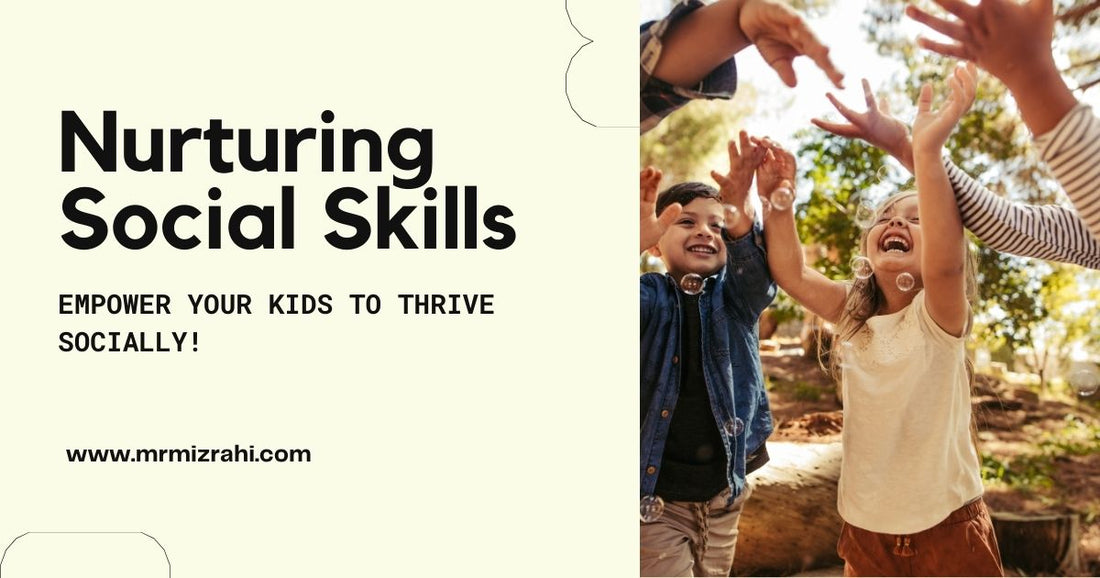
How Can I Help My Kids Develop Better Social Skills?
Share
As parents, we often worry about our children's academic achievements, but social skills are just as important—if not more so. Strong social skills help kids build friendships, navigate challenges, and thrive in different environments. The good news? Social skills can be taught and nurtured, just like any other skill.
Why Social Skills Matter
Your child’s ability to connect with others will play a critical role in their success and happiness. Beyond academics, social intelligence helps kids build meaningful relationships, handle rejection, and manage conflicts. Even as adults, we're still learning these lessons, so it's never too early to start.
Key Social Skills for Different Ages
Preschool and Elementary School Kids:
According to research from Vanderbilt University, the top 10 social skills kids need to succeed in school are:
- Listening to others
- Following steps
- Following rules
- Ignoring distractions
- Asking for help
- Taking turns in conversations
- Getting along with others
- Staying calm in social situations
- Being responsible for their behavior
- Doing kind things for others
These aren’t just about being “nice”; they lay the foundation for empathy, cooperation, and resilience.
Pre-Teens and Teens:
As kids grow, social dynamics become more complex. They face peer pressure, identity struggles, and emotional ups and downs. Key skills for this age group include:
- Setting personal goals
- Identifying and changing self-defeating behaviors
- Assertiveness
- Empathy
- Constructive anger management
- Conflict resolution
How You Can Help
-
Model Positive Social Behavior
Kids learn by watching us. Show kindness, patience, and respect in your interactions. Simple acts like greeting neighbors, thanking service staff, or calmly resolving conflicts at home set powerful examples. -
Avoid Labels
Don’t label your child as “shy” or “outgoing.” Labels can stick and shape how kids view themselves. Instead, acknowledge their feelings and encourage them gently: “It’s okay to feel nervous when meeting new people. Let’s think of some ways to make it easier.” -
Practice Makes Perfect
Create opportunities for your child to interact with others. Playdates, group activities, or family gatherings can help. Even role-playing different social scenarios at home can build confidence. -
Talk About Social Situations
After social events, discuss what went well and what was challenging. Ask questions like, “How did you feel when you met someone new?” or “What could you do differently next time?” This reflection helps kids process experiences and learn from them. -
Encourage Empathy
Help your child understand other perspectives. When conflicts arise, ask, “How do you think they felt?” or “What could you do to make them feel better?” Empathy is the cornerstone of strong relationships. -
Stay Patient and Positive
Social growth takes time. Celebrate small victories, like making a new friend or handling a disagreement calmly. Your encouragement boosts their confidence.
When to Seek Extra Support
While most kids develop social skills naturally over time, some may need additional support. Consider seeking guidance if your child:
- Struggles to make or keep friends
- Has difficulty handling conflicts
- Shows signs of extreme shyness or anxiety in social settings
- Exhibits aggressive or withdrawn behavior regularly
In these cases, talking to a teacher, counselor, or child psychologist can be helpful.
Final Thoughts
Social skills are a lifelong journey. By modeling positive behavior, providing opportunities for practice, and offering gentle guidance, you’re setting your child up for success—both now and in the future. Remember, it’s not about raising the most popular kid; it’s about helping them build meaningful connections and feel confident in who they are.
Coach Benjamin Mizrahi. Educator. Learning Specialist. Family Coach. Father. Husband.
More articles on EXECUTIVE FUNCTIONS COACHING – Benjamin Mizrahi
